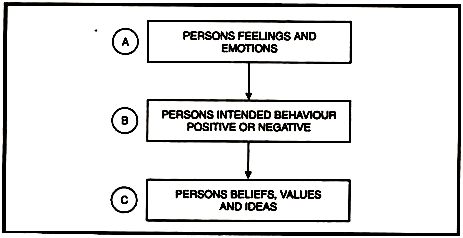Attitudes
Attitudes have been described as hypothetical constructs that represent a person’s like or dislike for anything. Attitude is a judgment made on the ‘attitude object’ (a person, place, task, event, skill, etc.). Judgments from attitude can range from positive, negative or neutral.
Nature of Attitude
- Attitudes refer to feelings and beliefs of individuals or groups of individuals. For example “He has a poor attitude”, “I like her attitude.”
- The feeling’s and beliefs are directed towards other people, objects or ideas. When a person says, “I like my Job”. It shows that he has a positive attitude towards his job.
- Attitudes often result in and affect the behaviour or action of the people. Attitudes can lead to intended behaviour if there are no external interventions.
- Attitudes constitute a psychological phenomenon which cannot be directly observed. However, an attitude can be observed indirectly by observing its consequences. For example, if a person is very regular in his job, we may infer that he likes his job very much.
- Attitudes are gradually acquired over a period of time. The process of learning attitude starts right from childhood and continues throughout the life of a person. In the beginning the family members may have a greater impact on the attitude of a child.
- Attitudes are evaluative statements, either favourable or unfavourable. When a person says he likes or dislikes something or somebody, an attitude is being expressed.
- All people, irrespective of their status and intelligence hold attitudes.
- An attitude may be unconsciously held. Most of our attitudes may be about those which we are not clearly aware. Prejudice furnishes a good example.
Components of Attitudes
Attitudes comprise of three basic components: emotional, informational and behavioural.

- Informational or Cognitive Component
The informational component consists of beliefs, values, ideas and other information a person has about the object. It makes no difference whether or not this information is empirically correct or real. For example, a person seeking a job may learn from his own sources and other employees working in the company that in a particular company the promotion chances are very favourable. In reality, it may or may not be correct. Yet the information that person is using is the key to his attitude about that job and about that company.
- Emotional or Affective Component
The informational component sets the stage for the more critical part of an attitude, its affective component. The emotional components involve the person’s feeling or affect-positive, neutral or negative-about an object. This component can be explained by this statement.” I like this job because the future prospects in this company are very good”.
- Behavioural Component
The behavioural component consists of the tendency of a person to behave in a particular manner towards an object. For example, the concerned individual in the above case may decide to take up the job because of good future prospects. Out of the three components of attitudes, only the behavioural component can be directly observed. One cannot see another person’s beliefs (the informational component) and his feelings (the emotional component). These two components can only be inferred. But still understanding these two components is essential in the study of organizational behaviour or the behavioural component of attitudes.
ABC Model of Attitude

All the three components of attitude explained above constitute, what is OF called the ABC model. Here, in the ABC model, the alphabet A stands for Affective component, B for Behavioural and C for the cognitive component. The importance of this model is that to have a proper and thorough understanding of the concept of attitude, all the three components mentioned above must be properly assessed. It is only the behavioural component which can be directly observed, the other two components: affective and cognitive can however only be inferred.
Beliefs
Beliefs are ideas about the nature of social world, supernatural reality, a person or an object which one believes to be true and acts accordingly. Beliefs may be based on facts or may be without factual evidence. According to Ellis (1973), beliefs generate emotions.
Sadness/anger is the result of the belief about being abused and not of the event (abusing). Individual beliefs play very important role in the behaviour of a person, therefore, caseworker should try to tackle and manage these beliefs.
One frequently believes
(1) “It is awful that I am imperfect and am disapproved”
(2) “It is terrible that you are treating me less than ideally”
(3) “Or, it is horrible that the world is so onerous and ungratifying.”